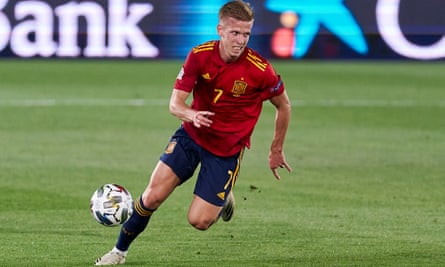[ad_1]
In one corner, Dani Olmo. In the other, Juan Mata. On the screen and on the pitch. Tomorrow night, Manchester United meet RB Leipzig in the Champions League; now, two of their players meet over Zoom, aware that unless something strange happens in Paris, come 10 o’clock Tuesday only one will remain in the competition, their fate in each other’s hands. “It’s a pity we can’t both go through,” Olmo says. “It’s difficult: we didn’t want to reach the last game in this situation,” Mata says.
The two Spaniards have been talking about playing football for fun, connecting with the child inside, but this is a bit serious for that. “In those final minutes before the match, it’s impossible to avoid the emotion, the nerves, those feelings, the thought: ‘We have to win,’” Mata says. “Well, draw in this case. Truth is, there are elements of professional football that make it harder to enjoy: the demands to get a result, to play well or lose your place, to perform in front of 80,000, not with your friends in front of no one.
“And when you win, because that’s your duty, it’s more relief than happiness. Why? Because in three days you have another game you have to win. It’s so constant that it’s hard to savour victory. But however high the demands it’s important to think: yes, there’s an objective, a plan, responsibility, but I’m going to enjoy this, on this perfect pitch, with this ball. And the more you remember that, the better you’ll play. So, Dani, please keep that in mind.”
“I will,” Olmo says, “and my best games are always the ones where I have enjoyed it.”
Mata is 32, Olmo 10 years his junior, and there are certain parallels in their careers: in positions, styles, and the paths they took, leaving home young, and having the nerve to depart big clubs in search of opportunities – Mata forced his way out of Real Madrid’s youth system, Olmo left Barcelona for Croatia – even in the role of their footballing fathers. Both European under-21 champions, next year Olmo may play at the Olympics and the Euros in the same summer, as Mata did in 2012. “If they don’t overlap, why not?” he says. “Do it,” Mata urges.
“I was 15 when I left Asturias, 19 when I went to Valencia. And all that makes you mature – maybe earlier than you should,” Mata says. “I went to Croatia at 16, thinking that was the best way to progress,” Olmo says. “Yes, it’s hard but in the first few years my mum went with me and I was always clear what I wanted to be. I am where I am now, at Leipzig and in the national team, because I went there then. I see Juan as a role model.”
“The first thing I’m envious of in Dani is his age, and all the football he still has before him,” Mata laughs. Mata’s own future is unsure. “I’ve thought about retirement, what it will be like, but I have no idea. Football is an emotional roulette, every three days, short term goals, the pace of life, suffering defeats, facing objectives, and it’s hard to find a role after. I don’t know what I’m going to do. I really hope I have plenty of years left, that an ex-footballer’s life is a few years away. You have to find a meaning to your life, not just live off what you were.”

“I look at Dani with pride and I have a lot of hope for him: the level he’s at, he’s already in the national team, and he’s someone I enjoy watching play,” Mata continues. “It’s very hard to play against him, as we saw at Old Trafford: he assists, he scores, he combines well, has vision, he’s very complete. And I’m sure he hasn’t reached his ceiling yet.”
“You’re making me blush here, Juan,” Olmo says.
“And to have a player that young thinking about how he can help through football, someone thinking beyond the game, is something to feel proud of him for,” Mata adds. Olmo joined Common Goal, supporting initiatives in Croatia – his “second home”, he says, a country “that didn’t come out of war that long ago and where you still see the scars, the effects”.
“We’re living through a moment where players are seeing the power they have, the platform to reach people and help,” Mata notes. “Players like Marcus [Rashford], [Raheem] Sterling, Héctor Bellerín, [Jordan] Henderson at Liverpool, when the collective fund was created. That’s a symptom too of the moment we’re in. Sadly, sometimes it seems we need something to happen to realise we all depend on each other, need each other. The most affected are the ones already in the worst situations.”
“I don’t see social causes as something outside of football; it’s integral to football, which is a tool for inclusivity, equality, an escape valve for boys and girls who come together through football, are educated through football, make friends there, find a safe space. It’s important to take football closer to people. Football has to extend a hand.”
In empty stadiums, the distance can appear greater. “Football is a bit strange now without fans, very sad: they’re the essence of football and, while [their absence] is a reality, we don’t want to get used to this,” Olmo says. “We want them back, to return to normal in football and life. It would have been very special to have played at Old Trafford with fans and here too. Hopefully we can still enjoy this. It will be difficult, it will be close, but we’ll do what we can to win. It’s in our hands.”
[ad_2]
Source link